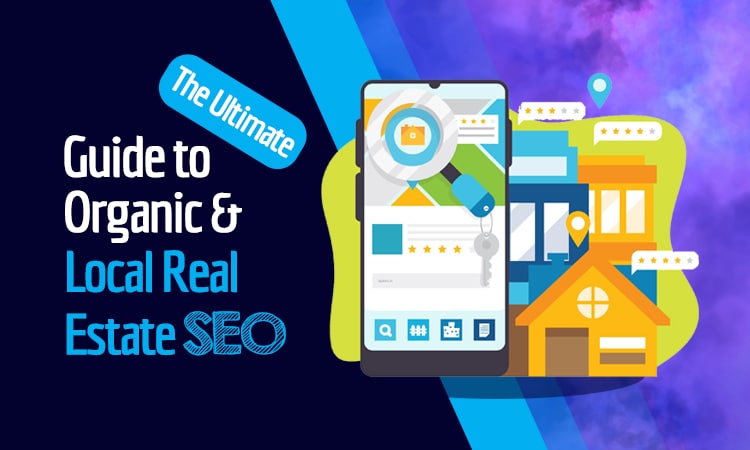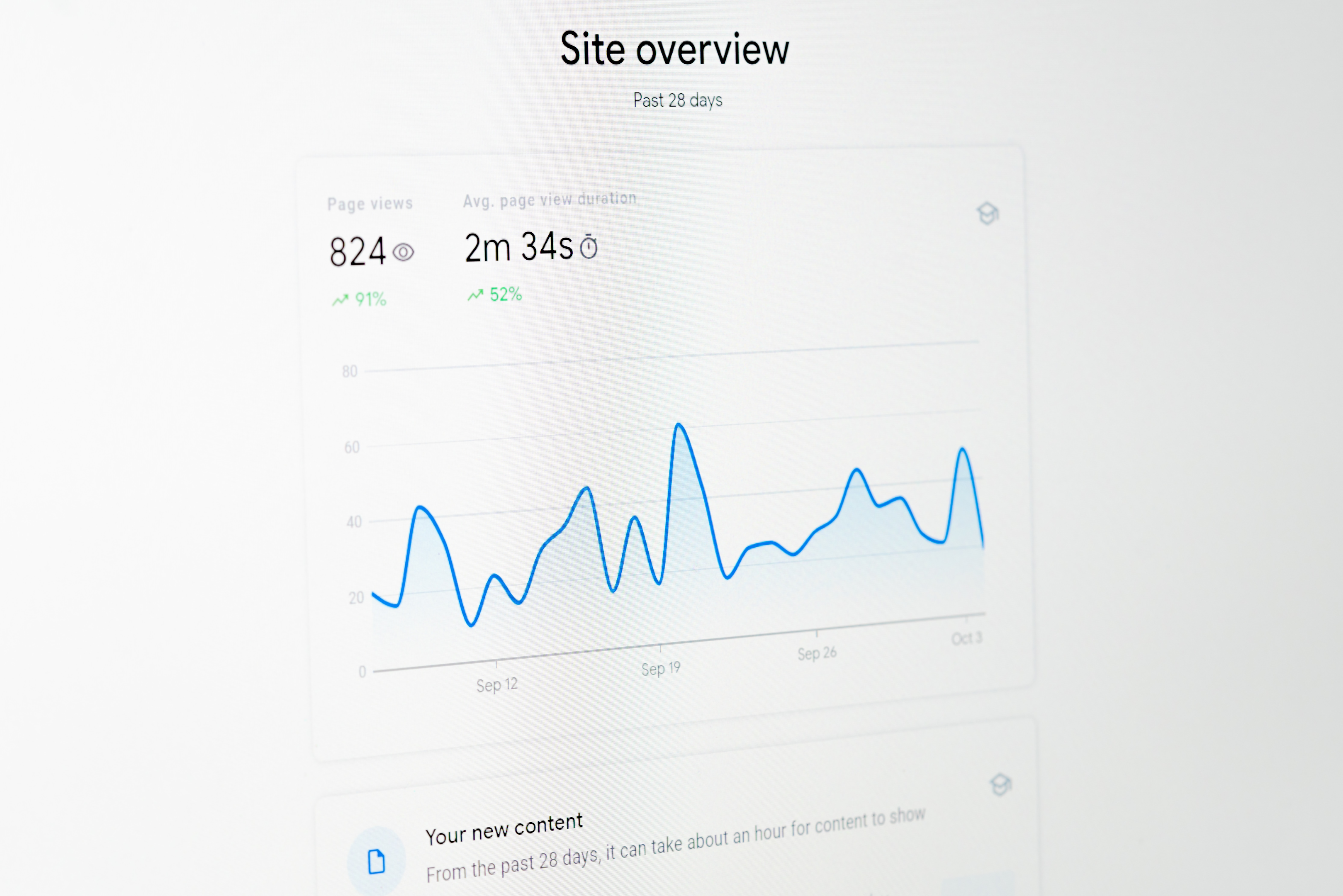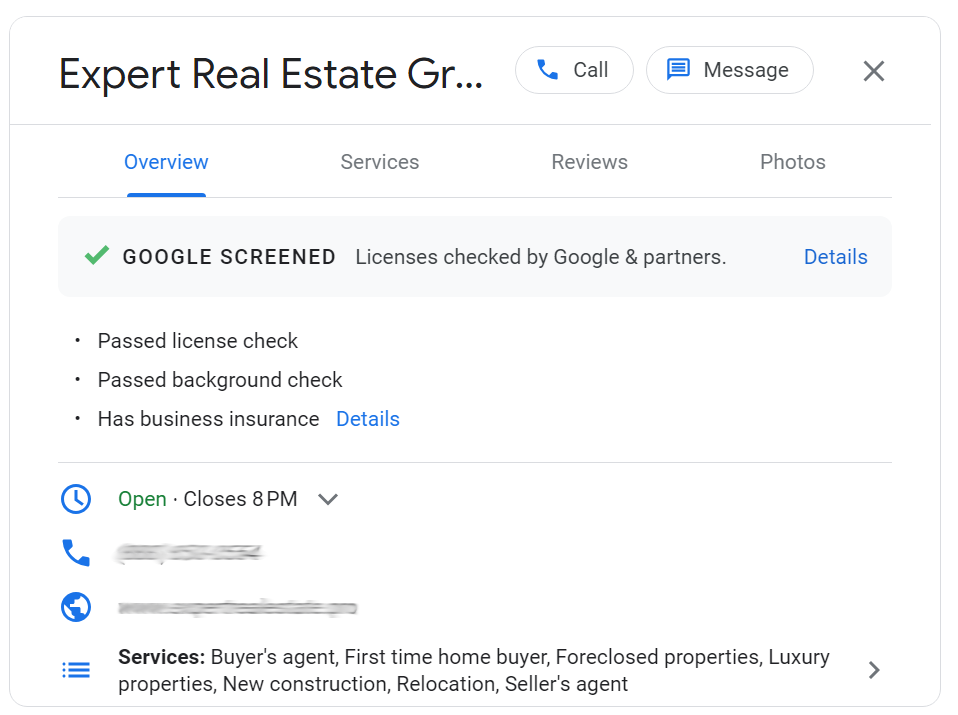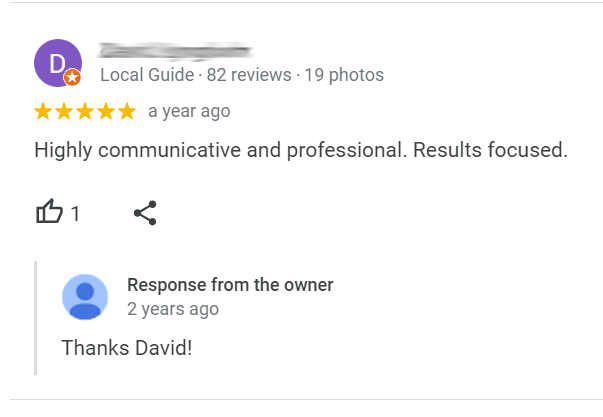Getting Started with Real Estate SEO
We don’t need to tell you that the real estate industry is competitive: you’re vying with dozens of other real estate businesses in your area for a limited number of houses, which means that you need every possible advantage to grow your portfolio.
You have the experience, passion, and expertise necessary to guide buyers and sellers through the process, but you need to help prove that to potential clients before they even step in for a consultation. How can you achieve this? By SEO for real estate agents & brokers.
Are You A Real Estate Investor Looking For More Properties To Buy? Be Sure to Check Out Our Guide on SEO For Real Estate Investors.
The real estate business, for better or worse, has gone online: in 2020, The New York Times reported that nearly every aspect of a real estate transaction can now be done remotely, from 3D viewings of homes to signing the closing papers with DocuSign.
This means that potential clients are also seeking agents online, making it all the more important that you fight for that essential real estate at the top of search engine results.
Your goal is to sell houses; our goal is to help you sell them by getting your real estate business seen by as many eyes as possible. Stellar SEO is a leading force in real estate SEO, helping our clients get more traffic by delivering quality content on time, every time.
We’ll work with you to improve your odds of ranking high with the search engine algorithms by performing local SEO optimization, fleshing out your real estate website with great information, and harmonizing all of your online profiles so you have a coherent battle plan to appear high in organic search results.
As a leading real estate SEO expert, we believe knowledge is power, and so we’d like to demystify real estate SEO through this comprehensive guide.
Read on to learn everything you need to know about search engine optimization so you can master real estate SEO and watch your commissions soar.
What Is Real Estate SEO?
Search engine optimization (SEO) is the process of optimizing your real estate website and online marketing in order to appear as high as possible on Search Engine Results Pages (SERPs).
This is done by a variety of factors, which we’ll discuss shortly, but the bottom line is that it is a way to tailor your site to the search habits of consumers.
Search engine optimization ensures that Google and other search engines rely on you to provide quality content to those learning more about the real estate industry – thus driving more traffic to your site.
How the SEO Industry Has Changed Over Time
In the early days of the Internet, an SEO strategy was quite primitive. Quantity ruled over quantity, and those who hit enough keywords matched to search queries would be favored by search engines, even if their content wasn’t useful or even particularly relevant.
For a real estate SEO strategy, this could include giant lists of all the towns you serve without any associated content, or nothing but a giant button directing a user to other websites with a bunch of white text surrounding it: visible to crawlers, but not to the average consumer looking for information.
As Google and other search engines have evolved, so has the search engine optimization necessary to rank well. Now, Google punishes those who use these underhanded tactics, as it’s recognized as manipulative and unhelpful.
We call these dangerous tactics black-hat SEO, as opposed to the white-hat and gray-hat tactics that Stellar SEO uses to help our clients do well while still abiding by the guidelines of a search engine.
White-Hat, Gray-Hat, and Black-Hat SEO
SEO tools can be broken down into three categories: white-hat, gray-hat, and black-hat. They each carry a level of risk to them, but the danger rises precipitously when you move into black-hat territory.
Search engines may penalize your website if it identifies these tactics, pushing you to the third, fourth, or even fifth search engine results page.
None of these tactics are illegal, but some go against Google Search Essential guidelines and will push down your rankings in search results.
A white-hat SEO strategy is all about creating true value for site visitors through a large volume of excellent content, a highly functional website, and a network of reputable backlinks from sites with high organic traffic.
Solid meta descriptions, relevant keywords, and a responsive design that looks great on both desktop and mobile devices are key here.
Gray-hat SEO involves those tactics that are not explicitly banned by Google’s terms of service but may result in penalties if terms of service change in the future or if it’s misidentified as black-hat. The lines are blurrier here, and some strategies may result in quick wins but long-term losses.
We research and plan carefully whenever using gray-hat SEO to reduce any potential risks, balancing the risks and drawbacks of every strategy.
On the other end is a black-hat SEO strategy, which uses things that are explicitly banned by Google’s terms of service. This includes things like keyword stuffing, where you use white text and code to jam as many keywords into a site as possible.
It’s also black-hat SEO to duplicate the same content on multiple pages across your site, as this doesn’t provide site visitors with more value.
Stellar SEO avoids all black-hat strategies: while they may provide quick wins, they are highly dangerous over the long term.
Why Is a Real Estate SEO Strategy So Important?
Real estate SEO is everything because search results are everything. Gone are the days when someone would look you up in a phonebook and call you; now, they’re finding a reputable real estate agency by combing the search engine results page.
That wasn’t a typo: generally, people will only look at the first page of the search results unless they’re not finding what they need. Given how crowded the real estate niche is, they have little reason to go further.
Not only does search engine optimization drive more traffic, but it also reduces your own efforts over time because you’re not having to reach out to every potential client – your content is doing that for you.
Streamlines Efforts to Reduce Wasted Time
SEO for real estate might seem difficult, but it’s actually designed to simplify your life: it makes your real estate website easier to navigate for users, guides you to what type of content to write through long tail keywords, and tightens up your Google Business Profile so that it’s much simpler for you to run Google Ads.
You can think of it not just as a tool to boost your rankings in search results, but as a framework for your entire online marketing strategy, making sure that you’re not spinning your wheels on efforts that don’t get you noticed by search engines.
Passively Generates Real Estate Leads
One of the best aspects of real estate SEO is that it turns your real estate website into a lead-generation machine. You’ve sold your real estate business to a potential customer without even talking to them, and they know exactly how to contact you thanks to your Google Business Profile and well-designed website.
Home buyers will come in knowing all about every real estate agent you employ through online reviews and profiles, and they’ll arrive with thoughtful questions about the home-buying process they gained from a fabulous blog post on your site.
You won’t have to start questions from square one; instead, you can jump right into talking about the local market and the home purchase or sale process.
This means you can spend less time hunting down potential customers and more time perfecting real estate listings, negotiating with buyers or sellers, and using analytics like the Google Search Console to perfect your marketing strategy.
Keyword Research: The First Step to Great Real Estate SEO
SEO for real estate websites is built on keyword research. To appear in search results, you need to match the queries that users are making.
Queries can be incredibly exact long tail keywords, like “what is the average house price in Tuscon AZ” or more general local keywords, like “tiny houses Nashville.”
Some real estate SEO keywords are much harder to rank for than others because they have a higher search volume.
Usually, more general real estate keywords, like “realtor,” are going to be incredibly competitive as they are taken up by national real estate companies.
Because of this, local businesses will want to prioritize their efforts on local search terms. This can be terms that are explicitly geotagged, like “real estate agent Chicago,” or those that rely on location tracking by Google, like “real estate agents near me.”
Consider Intent with Keyword Research
When performing keyword research to develop new content or flesh out your real estate website, you need to consider why someone is searching for this particular term, as it can help you mold your material to its exact intent.
This is called search intent, and there are four different types.
Commercial Intent
A user wants to buy something or hire a service. In real estate SEO, this will include searches like “real estate listings” or “real estate agency San Francisco.”
Informational Intent
The user is just looking for information: they’re not yet ready to purchase anything or contact a realtor. It could include things like “home buying process” or “should you get preapproved before or after talking to a realtor.”
These queries are gold for developing a blog post or information video content that will answer the user’s question and get them lingering on your site a while longer.
Navigational Intent
Here, the user wants to get somewhere specific, whether that’s a website or a physical location. For the real estate industry, these will be searches for a particular real estate agent or site.
Now local SEO optimization comes into play: by having a complete Google Business Profile and clear contact information, you can get users to your website or profile before they have time to peruse any other websites.
Investigative Intent
With these users, they want to compare their options before contacting real estate businesses. Here, online reviews are everything: over 85% of consumers check reviews before contacting a business, and they are more likely to trust a company that has reviews over one that doesn’t.
In this category, you might see things like “top real estate agent near me” or “best real estate companies in Indianapolis.”
Searches like this are why it’s essential that you solicit online reviews from happy clients to help draw in more.
Crafting Keywords to Target Multiple Intents
It may be daunting to find and apply real estate keywords, but don’t worry: you can often target multiple intents with the same material, receiving organic traffic for several different purposes.
The key here is to provide comprehensive, quality content that will answer the questions posed by each search intent, ensuring that your readers come away happy no matter why they came there.
Here’s an example: you have “home buying Rhode Island.” There are several potential intents here, giving you options for what to do. First, we can assume that this is a home buyer rather than a seller; otherwise, they would have searched for “home selling” instead.
Now, we can think about what they actually want. The user may want to buy a home right now (commercial intent) or they may simply want more details about how to buy a home (informational intent).
Given that they included a specific location, it’s likely that they’re seeking very specific information about the Rhode Island real estate market, whether that is just to better understand their options or to look at listings.
Thankfully, you can tackle all of these needs on one page. Your page may look like this:
- A short profile about your team with a call to action
- A widget displaying the current homes you have listed in Rhode Island
- Information about the home buying process in Rhode Island, such as average house prices and any applicable laws, with links to reputable sources and statistics
- Links to other pages about Rhode Island-specific real estate information
- Customer reviews affirming that you’re a great team
- Another call to action, followed by more navigational links
With that, you’ve satisfied both possible intents, as well as encouraged users to linger on your site a bit longer to retrieve more information. You can also use other, related keywords throughout the page to direct more users to the site who have similar inquiries, and thus provide them with a one-stop-shop for their needs.
Organic SEO: High on Search Engine Rankings, Low on Advertising Investment
Organic SEO for real estate is all about getting higher in organic search results; this means that it’s not paid advertising like Google Ads, but rather about meeting the benchmarks that search engines rely on to find good pages to show users. When people come to your site from clicking a link in organic search results, we call this organic traffic.
Top ranks for Google searches are incredibly valuable real estate because many people use ad blockers, particularly on desktops.
While your user may see your ad on a mobile search, they will entirely miss it should they be using an ad blocker on their laptop, so you need to focus on appearing high for organic searches in your region.
The Types of Search Engine Optimization Projects
Real estate SEO is a comprehensive strategy that takes a look at every aspect of your digital footprint. As such, there are four different areas you must focus on, each of which has its own subgoals and subprojects.
All of them work together, and many aspects of one area are interwoven with components of another. Rather than looking at these as discrete categories of SEO for real estate, think of them more as subject areas, which will then interact with other areas of expertise.
On-Page SEO
On-page SEO is about your actual website: how it functions, how it looks, and what it contains. When we talk about on-page SEO for real estate, we are generally discussing written and visual material, such as page titles, landing pages, blog posts, images, and embedded video content.
When you work with us to fine-tune your real estate website, we will develop rich, well-researched copy based on keyword research that matches the expectations of users. We’ll also ensure that you have plentiful internal links to help Google and its users navigate.
Technical SEO
Technical SEO refers to how your website actually functions as seen by a computer. Google and other search engines crawl sites in order to index them; in other words, they will investigate your page before displaying it to users.
Google will privilege sites with a fast loading time, well-organized code with good meta descriptions, and comprehensive internal links to help direct crawlers to new pages that haven’t been indexed yet.
Broken links, messy code, and sites not optimized for mobile devices will all harm your search engine rankings.
When working on technical SEO, Google Search Console is a vital resource. You can submit your site to be indexed, identify any issues that need to be fixed, and perform some statistical analysis regarding how people are navigating to your site.
Google has developed some helpful guides to get you started with Google Search Console which will walk you through every step of the process.
Off-Page SEO
You can think of off-page SEO as your real estate business’s overall reputation on the internet. It’s not enough to have an excellent real estate website: the rest of the internet has to agree and prove it by linking to your material on other websites.
Google considers Expertise, Authoritativeness, and Trustworthiness (E-A-T) when deciding how to rank sites. All of these can be influenced by how many people are linking you – and how reputable those sites are.
For example, if you’re linked in an article by Forbes or Entrepreneur, this will be seen more favorably than a link from a website that gets less than 1,000 clicks per month.
Building quality backlinks takes time, as it’s important to carefully vet the authority of those who are linking to you and build strong relationships with good organizations.
You want to have a wide range of backlinks from trusted authorities rather than just a large pile of backlinks from one mediocre site.
Other off-page SEO for real estate includes things like shared social media content, guest posts on other sites, online reviews, your Google Business Profile, content syndication (posting on multiple websites like LinkedIn or Medium), and even appearing on real estate podcasts.
In short, you need to get people talking about you and sharing your posts.
Local SEO
Local SEO for real estate involves showing up in geotagged searches, whether that is an explicit search with a location name or a search performed with location tracking.
The most crucial element of this is your Google Business Profile (formerly called Google My Business): this small listing, when filled out with pictures, copy, and reviews, will serve as a hub for anyone searching for real estate agents in your area, helping to dramatically boost your leads.
On-Page SEO for Real Estate Agents/Brokers
Now that we better understand the different types of SEO for real estate, let’s take a closer look at on-page SEO.
As we mentioned previously, this is about how your website functions and what it contains; as such, it’s vital that you develop great content to fill a great website.
First, we’ll discuss the elements that you need to focus on when considering technical SEO before moving on to the actual content that will fill out your site.
Top Search Engine Ranking Factors for Real Estate Websites
While Google is relatively secretive about exactly what goes into its algorithm for search engine rankings, we do know many of the factors that influence how well a site performs on search engines.
Site Architecture: Real estate websites must have a coherent, well-designed navigation system, as well as strong links within each page.
For example, you should have a navigation bar that gives a general overview of the different areas of your site, with subsections covering more precise areas.
Internal Links: Everything needs to link back to something – no orphan pages here. Link landing pages back to the homepage, link a blog post to another post, and be sure to have quick links at the bottom of an article to get users back to the main area or landing page.
Page Speed: A fast website makes for happy users on both desktop and mobile devices. Using tight, streamlined code is invaluable.
Titles and Headers: No one – including search engines! – wants to read an enormous block of text that has no signposts saying what the different sections mean.
Meta Descriptions: A meta description is a small snippet of text that displays below the title in search engine results; it explains what the page is talking about before someone clicks on the title.
As an example, if your title is “How To Sell Your Home in Under a Month,” the meta description would say something like, “Learn how to write a quality listing and stage your home to quickly attract buyers.”
You want to keep this short, as it will be truncated to about 120 characters on mobile.
User Experience: People love beautiful sites, and they will be more likely to stay a while if they’re enjoying the view. Show off your interior design skills by sharing lovely pictures of homes you’ve sold; pick bold, attractive colors; and don’t forget about using fonts that are easy to see on any device.
Mobile responsiveness: Your user may be sitting down at their desktop at work, or they might be scrolling their mobile device after they thought of a pressing real estate question.
Your real estate website should be responsive, meaning that it will adjust to match the screen display of the user’s device; this can include hiding sidebars for mobile devices so that they can focus more on the main content or automatically adjusting font sizes.
Quality content: You need to have excellent material to populate your page – it’s non-negotiable. This means no keyword stuffing, no spamming, and no machine-generated content that is useless and unreadable to the average person.
What exactly does quality content include for real estate SEO? We’re glad you asked.
Content SEO for Real Estate Agents
Here, we’re referring to content both on and off your page, but we’ll start with on-page SEO content.
You’re an expert in the real estate field, so you need to show it off. First, start with your keyword research that we discussed before: find out what people are searching for.
You can boost this process by using tools like Ahrefs, Moz, and Semrush to see what are the most highly ranked real estate keywords in your area, then finding ways to integrate them naturally into your content.
Natural is the goal here: it shouldn’t be obvious to home buyers or sellers that you’re just trying to cram as many keywords in as possible to rank high in search queries. Instead, it should feel natural and fluent. Don’t use the same terms multiple times in a sentence or even in a paragraph; use variations and synonyms.
Keyword research will help you know exactly how to phrase your landing pages and main page, but they are also an invaluable resource when you’re figuring out what additional content to include, such as topics for a blog post or a video.
Here, look at long tail keywords, like “how to prepare a house for sale,” and use them as a guiding principle for your article.
Developing a Strong Content SEO Strategy
To develop your content strategy, you need to know what people are looking for and match their expectations. People plug millions of questions into search engines every day, and you want to be the one to answer real estate-related inquiries.
If you already have existing content, run a content audit to see how it’s performing. What are the most popular social media posts, blog posts, and pages on your site?
A content audit tells you what people want to hear more of, and you can begin to create ideas off this. You should also take a look at what you’re currently missing and aim to fill that gap.
Let’s say you have nothing yet and want to start from scratch. Here, go back to your keywords and identify what you can talk about.
This is easier for long tail keywords: they often have a question embedded in them, like “how to find a good investment property.” Put that as your title, including the term at least once more in the body content itself, and ensure that you keep everything relevant to the main question.
However, you can still Let’s take the search term “cheap houses Tennessee.” While many Googling this will just want to look at real estate listings, they may have other questions as well, such as:
- Can I afford a home in Tennessee if I make minimum wage?
- What markets in Tennessee are the cheapest?
- Can I get a mortgage for less than $60,000?
- What is the process of buying an as-is home?
- Why are some homes so much cheaper than others?
- What do I need to look out for when buying a cheap home?
- Can real estate agents help me with bidding at a sheriff’s auction?
As you can see, there are countless ways that you can predict questions that home buyers may have – and this is for only a single search term. Go through the keywords you’ve identified and take a moment to think about it from a buyer’s or seller’s perspective, keeping in mind the search intent categories we talked about previously.
What is behind the keyword here? What are the purposes behind this inquiry? What information can you provide that would be well-matched to a variety of different intents?
Develop ideas that meet expectations, create a list of posts to create, and then set up a posting schedule, just like you develop listing schedules and meeting calendars.
Link Building
Now that you’ve got a good idea to write about, there’s another pivotal question: will you host this content on your real estate website, or will you publish it elsewhere?
Publishing your excellent real estate articles on other sites is a crucial component of link building, which is the art and science of acquiring backlinks from reputable sources that direct users to your own site.
As real estate SEO experts, we have a strong network of great publishers who crave your content. We’ll help you develop excellent articles that match user expectations, then place them on websites that cater to your specific niche.
This will help establish your authority and expertise across the internet, which helps search engines recognize that you are a valid resource that their users will want to see.
Integrating Organic SEO and PPC Campaigns
It’s easy to think of real estate marketing as a zero-sum game: either you focus on paid advertising or you work on your real estate SEO.
In actuality, both SEO and PPC campaigns like Google Ads work well together, and you should see them as two aspects of the same goal. Both are about funneling potential customers to your real estate website, where they can then contact you for further information.
The tools you use to create a Google Ad campaign are crucial SEO tools as well. For example, you need to have a fully developed and accurate Google Business Profile in order to run an ad campaign; this is an essential tool for local SEO because it serves as your home base on Google search pages.
Google Keyword Planner, which you can use to collect keywords for Google Ads, will also assist you in your overall real estate SEO because it will show you what terms you should focus on when crafting the rest of your content.
A great real estate ad is one that users click on to find out more about a specific facet of the business; you then take them to a landing page that not only answers their questions but also explains why your real estate agents are the best ones to guide them through the home buying or selling process.
Maybe you want to craft an ad campaign targeting luxury home buyers in Dallas. You’ll build out your Google Business Profile, sign up for an ad campaign, and then use Google Keyword Planner to determine how to phrase your ad.
From there, you’ll send users to a page specifically about luxury homes in Dallas, where you outline everything they need to know and describe why you are the best one to help them find that perfect property.
Not only can this specific page rank high for organic searches, but it will work great for an ad campaign as well. It also satisfies local SEO because you are ranking well for the local keywords that help bring you clients.
Tracking Your Website Performance With Google Analytics
Google Analytics is an essential tool to see how your website is doing and what you may need to improve. It provides you with an abundance of statistics to analyze, such as:
- Website traffic
- Conversion rates
- Entrance and exit pages
- Bounce rates
- Average session duration
These will all be provided to you in a spreadsheet, where the particular metric will be paired with a particular dimension, such as a certain page, in order to provide data.
There are an enormous number of filters you can use, such as specific time periods and geographic regions, to better understand when your users are visiting, where they are, and what they’re doing while they’re there.
While all the data in Google Analytics can be useful in some form, a few key metrics are most helpful when refining your SEO for real estate. These are the ones that can help you find new keywords, revive pages that are flagging, and identify key areas of concern with your website.
Sessions by Organic Keyword
This tells you what users searched for that led them to your page: it tracks them from Google and onto your website. With this metric, you can identify which keywords are getting the most utility and better tailor your approach to match these expectations.
It’s always good to know what you’re doing well, but you also need to be able to improve keywords that aren’t getting the numbers you need.
For instance, are people searching for “ranches in Montana,” not finding what they want, and then immediately leaving? This tells you that you need to build up this component of your website to better meet the needs of your audience.
You can perform research to see what other sites have that you might lack and strive to include those details.
Goal Completions
This is a more refined version of conversion rates, which allows you to identify a specific action that you want users to complete and track how many people complete it. You might want to track how many people are filling out a contact form or clicking to view your real estate profile on another site – now you can get this highly precise data to improve your conversions.
When it comes to boosting goal completions, verbiage and imagery matter a lot here: a clear call to action coupled with an obvious link is like catnip to a user who wants to get in touch.
Make sure that things like fillable forms or “Contact Me Here” buttons are unmistakable, attractive, and don’t look spammy.
Pageviews by Page
It’s vital that you know what pages on your real estate site are doing well and which are not so that you can workshop solutions.
Pages getting more traffic assure you that you’ve done something right, either with the title or the content itself, and that you should strive to replicate this success elsewhere. This could mean providing more content in a similar vein or using a similar formula for your titles.
For those pages that are being overlooked, examine the title and meta description: are they exciting yet accurate? Bold but not overconfident? Are you explaining exactly what you’ll discuss in a personable, authoritative way?
You can have the most incredible writing in the world, but if you’re not selling it to people through the title, they won’t even give it a chance.
How to Get Started with Google Analytics
Google Analytics can be a daunting tool: it’s so powerful and has so many dimensions that those outside of data analysis can feel quite intimidated. All of its data can be applicable to real estate websites, but it might take a bit of research to find ways to apply it to your overall strategy.
The best thing you can do is simply get started by placing the tracking tool on your website, and then begin to learn as you go along; the more data you capture, the better able you will be to see trends and determine what actions you can take to improve.
First, sign up for a Google Analytics account. If you already have an account, then ensure that you have the ‘Editor’ role. Now, you add the property: your real estate business. You’ll provide the name of the business, its industry and size, and what you intend to use Google Analytics for.
Google will automatically tailor your dashboard based on your intended purpose: if you state that you want to work on lead generation, then it will automatically show you the metrics most related to this. However, you can access all of the data points at any time.
Next, you’ll set up a data stream: the site that you’re tracking. Under the “Property” tab, click Data Streams > Add Stream, enter the URL of the site, and name it.
You can enable or disable enhanced measurement, which is what gives you the richest data to work with. We encourage you to enable enhanced measurement; you can always go back in and disabled those elements that don’t work for you.
Retrieving and Integrating Your Google Tag ID
In order to capture data to use on Google Analytics, you need your Google Tag ID, also known as your Analytics Property ID, to be embedded in every page you want to track. This requires you to access the HTML code of your website, which you will then copy and paste into the code.
Click on the Data Streams > Web, find the data stream for your website, and find the “Google tag.” When you click “install manually,” it will provide you with a code that you can copy and paste.
Place this directly after the <head> tag at the top of every page you will track.
It will take about thirty minutes to begin collecting data, after which you can begin digging in. As with most things, data collection takes time, so plan to analyze it weekly or biweekly instead of daily.
Resources to Learn Google Analytics
As you might expect, the best resource to learn about Google Analytics is Google itself. On their Google Analytics Skillshop, you can take a variety of different courses about their recent iteration, called Google Analytics 4; they range from beginner to intermediate.
Should you choose, you can even get a Google Analytics Certification to prove that you’re a total data wizard.
If this is intimidating to you, don’t worry: your real estate SEO experts at Stellar SEO can assist you with everything you’ll need to rank high on search pages, even if you don’t want to learn all about analytics.
Local SEO: Connect to Potential Clients Through Google Searches
Your real estate business is local, which means you need to prioritize local SEO.
While some real estate agents might service multiple areas, it shouldn’t seem like that to buyers or sellers: they should see you as their local real estate agent, someone who fully understands their needs and the whims of the local market.
Google Business Profiles
These are the business listings that a user will see if they search for “real estate agents near me” or a geotagged search like “real estate Boston.” They are concise pages that contain only the information that users are most interested in, which includes the following:
- Business name, address, phone number, and website (called NAP+W)
- Services provided (commercial real estate, residential real estate, and so on)
- Google Screening status
- Hours of operation
- Service area
- Customer reviews
- Photos
You can set up your Google Business Profile to accept messages directly from potential customers at the click of a button; it’s incredibly convenient for both you and your customers.
The Role of Consistent NAP+W
Your Name, Address, Phone Number, and Website (NAP+W) should be the same across all platforms, as this makes it easier for clients to get in touch.
These are known as citations, and having inconsistent citations in different directories can signal to Google – and to customers – that you are an unreliable, fly-by-night business. It features strongly in how well you rank for local searches, which can be the difference between getting a commission and losing out.
It’s important to note that a little inconsistency isn’t going to hurt you: using the +1 country code for one version of your phone number but omitting it elsewhere, or having dashes in the number and not elsewhere, doesn’t matter much.
What does matter is that the digits are all the same, your address has the right zip code, and your website is the same URL everywhere.
How to Set Up Your Google Business Profile
To set up your Google Business Profile, you’ll first need a Google Account; we recommend having a separate Google Account for your business that is tied to your business email domain. You can always link your separate and business accounts manually so that you don’t need to sign in and out all the time.
Then, you’ll set up your profile by inputting the name of your business. If someone has already verified your business, you’ll have to request ownership of the current profile.
Find your business category and mark whether or not you have a storefront staffed during business hours; for real estate, this is almost always yes. You’ll then give the exact address or set down a pin on the Google map.
Next, select your service area based on city names, counties, or postal codes. You can pick up to 20, but avoid selecting more than you can actually service.
Finally, give the phone number and website URL. If you have multiple officers, then put down the phone numbers for each location rather than routing clients to a call center.
You will need to have your profile verified before it is displayed to customers; we recommend doing this sooner rather than later. There are a few different options, which include text, video, email, and phone call, but the methods available to you will vary by region.
After you have verified your business, it may take a few days for your listing to be visible to consumers.
Google Screening for a Real Estate Agent
Google Screening is an additional process available for those that work in law, financial planning, real estate, or childcare to give customers additional peace of mind.
To get that green checkmark, you’ll need to undergo a license check; you may also need to undergo a background check and show proof of insurance, depending on what state you’re in.
It’s a relatively simple and straightforward process, and it has the added benefit of making you eligible for Local Ads services.
Google Business Profile Insights: Google Analytics for Local SEO
Similar to Google Analytics for your website, you can also assess metrics for your Google Business Profile using Insights. While not as comprehensive as metrics for Analytics, there’s still a lot of data you can review to get a better understanding of how many people are visiting your profile.
The most relevant metrics for real estate companies include the following.
Unique visitors: Unlike overall traffic, this counts users only once per day per device; this means that if someone checked your profile once on the desktop, then came back again later, you would only see one visit.
Searches: The keywords people are using to find your business. Knowing this can help you better target these needs on your website and other content.
Calls: How many people started calls with you through the click-to-call function on your profile. If this number is low, you might include an image in your photo reel encouraging people to call for a consultation.
Website clicks: You will have included your URL when setting up your profile. If you have a very complete Google Business Profile, you may need to entice people to visit your site by including a bit of information in the description about what more they can expect to read.
Messages: You can also receive messages directly from your profile, and this will track how many unique users reached out through messaging.
Menu clicks: Your Google Business Profile has a menu of different information, such as your verification status, reviews, and the exact services you offer. This tells you how many people were curious enough to take a look at this as well.
Total interactions: Every day, Google will send you a daily summary of all interactions, including these and others related to the real estate niche.
While a Google Business Profile is more standardized and therefore has less room for innovation, there’s still a lot you can do to differentiate yourself here and improve these metrics. Adding photos is a huge draw, as is soliciting customer reviews, which we’ll discuss now.
Reviews: An Invaluable Resource for Real Estate SEO
Real estate is built on trust: you develop relationships with buyers and sellers as well as throughout the industry in order to match people to their dream homes. There is no better way to demonstrate this trust than through having a large cache of positive reviews from former clients thrilled with your service.
The vast majority of consumers read reviews before making a purchase, even for something so small as a particular type of lotion. Their reliance on their peers only rises when it comes to more expensive, life-changing decisions, such as who can help them buy or sell real estate.
Great reviews are a critical component of trustworthiness across the internet, as they can give consumers a more impartial look at how a company actually operates beyond the glamor and rhetoric. As such, it’s critical that you know how to collect and display them – and how to respond to those that aren’t so kind.
Soliciting Reviews
Many business owners believe that reviews are just given spontaneously and out of the goodness (or anger) of someone’s heart, but it’s not true: you can and should solicit reviews from clients in a tactful way.
First, remind them at the conclusion of the service that you’d like to hear their opinion. Make it clear that their feedback matters to you and that it will help your business, then make it as easy as possible for them to do so.
A great method is to send out one email right after the service is completed with a link to your Google Reviews, encouraging them to submit one, and then follow up again in a week if you haven’t heard back.
There are three key elements here that you need to consider when developing these solicitations:
- Stressing the value of their opinion
- Making it easy to share their opinion
- Reminding them at least once to do so
In many industries, businesses may provide a free gift that is meant as a goodwill gesture, encouraging something in kind. For example, e-commerce companies might send a small bracelet or sticker pack out with a purchase over a certain dollar amount with a reminder to leave a review. This can work wonders for real estate teams as well: even just a lollipop can make a difference.
Collecting Previous Reviews for Advertising
Once you have reviews, you need to advertise them on your site. It’s important that you never make up reviews; even if you don’t get caught out on it right away, it creates an atmosphere of distrust.
It’s not enough to just tell people to look at your reviews on Google: you must integrate them into your site through attractive sidebars or simply snippets of text. For the best results, you can develop widgets that will link back to the actual review on another site, thus proving the authenticity of the review.
Choose small snippets from different reviews that focus on unique facets of your customer service, such as reliability, responsiveness, friendliness, expertise, or empathy. Attribute them in a uniform way, such as by first name and city of the reviewer, for both neatness and authenticity.
The Art of Responding to Reviews
Responding to positive reviews is pretty easy: you simply say thank you, tell them that you also enjoyed working with them, and reiterate you appreciate them taking time out to mention how happy they were.
It gets more difficult with negative reviews, as you need to take a certain tone that explains your position without sounding defensive. This can be challenging, and you might be tempted to just create a pat response that tells them you’re sorry and asks them to call you, but this can come across as disinterested, passive-aggressive, or even like you’re trying to hide something from others who read the review.
As a real estate agent, you’re naturally charismatic and personable, and you can lean into this when responding to negative reviews in order to get a better response.
Start by empathizing with the reviewer and telling them that you’re sorry they had a negative experience, then directly address any concerns they have in an objective manner before again apologizing and encouraging them to reach out if they have any further concerns.
The key is to state simple facts in a way that does not sound like you’re excusing yourself but only providing more context to the matter. Never resort to criticizing the reviewer or implying that they were entirely at fault; however, you can mention things that may have had a direct impact on their experience if it’s relevant.
Perhaps a buyer is upset that the closing documents weren’t prepared on time. You can apologize for the inconvenience, then point out that you needed to wait for information from the buyer – in other words, the reviewer was late giving you what you needed. This does not directly accuse them, so it doesn’t sound like an attack, but it gives more context to readers.
Tailoring Your Content for Local SEO
Local SEO isn’t just about your profile but about your content too. In your website and other documents, be sure to emphasize your experience with the local area by using place names, regionally specific information, and even specific street names.
Everything from famous landmarks, shopping districts, and geographical areas can be thoughtfully integrated into your writing to add local color and establish you as an authority in real estate for your service area. You can also create separate landing pages for different major cities in your area in order to better funnel those looking for particular markets to your site.
Let’s imagine that you sell real estate in New York City proper. You can have a different landing page for each of the different boroughs, personalized with information about major attractions and industries in this area, then subpages for particular neighborhoods in the borough.
This way, someone wanting to buy property in Queens doesn’t have to scroll through information about the entire city before getting to what they need.
It sounds like a lot of work, and it is. However, it’s invaluable work, as it helps users get exactly where they need to go on your website and provides them with the best utility. No one wants to click aimlessly around a website to find what they’re looking for; plus, once you’ve satisfied their needs, they may be more willing to sit and stay awhile, exploring what else you have available.
The Value of Local Associations for Real Estate SEO
Once you’ve optimized your own website, filled out your Google Business Profile, and started developing off-page content, you may believe that you’re set, but there’s one last key resource you need to consider: local associations.
Having connections to the community demonstrates that you are a trustworthy agent; it also helps cement your local SEO, as you will be strongly tied to other agencies in the local market.
Consider joining your local Chamber of Commerce or other local associations, as this will help you acquire backlinks to your website. You could consider writing a column for a local publication about real estate trends, ensuring that your website and contact information are provided on the page.
If you’d like to improve your real estate marketing, network, and develop local SEO all at the same time, think about co-hosting an educational event with another organization or company.
A recorded online class or event will show up well on search engines, providing value to consumers while also enhancing your online presence. Be sure to advertise the event both before and after in order to get more coverage.
Should you choose to sponsor an event, write a press release for a local media outlet touting your affiliation and explaining more about your services. This will boost your reputation within the community, and it will also provide you with more backlinks from resources with a high search volume of their own.
Your Real Estate SEO Strategy Checklist
We’ve reviewed a lot, so let’s take a moment to go back over all the real estate SEO tips we’ve covered and create a cohesive strategy. We’ll separate these into two sections: everything you need to do on your real estate website, as well as everything you need to do outside of your own site.
On-Page SEO: Content and Technical SEO
- Content SEO
- Perform keyword research, particularly for your local market
- Create a list of pages your website needs
- Develop a content strategy based on your keyword research
- Produce great content that meets user expectations
- Technical SEO
- Tighten up your website’s code to reduce loading times and improve crawling
- Develop a well-organized site architecture for ease of use
- Ensure your site is optimized for mobile
- Sign up for Google Search Console to track errors
- Use Google Analytics to measure performance and identify areas of improvement
Off-Page SEO: Link Building and Local SEO
- Content marketing
- Start link building (your Stellar SEO experts can help!)
- Set up social media profiles and post regularly
- Plan your content syndication: which sites, like LinkedIn or Medium, do you want to use?
- Develop relationships with other content makers like influencers and podcast hosts
- Local SEO
- Flesh out your Google Business Profile
- Solicit and respond to reviews
- Review your Google Business Profile Insights
- Develop relationships with nearby associations
Real Estate SEO Strategies: What to Avoid
Now that you know what you need to do, we’d like to reiterate what you must avoid as you develop your real estate SEO strategy.
Knowing what not to do is just as important as knowing what to do; build your methodology around avoiding these pitfalls and you’ll find yourself with great real estate SEO.
An Unfocused Content Strategy
While having an unfocused content strategy won’t necessarily hurt your real estate SEO, it won’t help either. You’ll waste time and energy that you could have spent on highly targeted and refined efforts that will get you ranked higher.
Firstly, you need to understand what keywords you’re going to target and develop a laser-focused plan around these content areas. Then, identify channels of distribution that will have the highest rewards and create a content schedule that lets you post frequently, ensuring content freshness. Lastly, track your progress and identify areas that need improvement so that you can keep reaching for the highest rankings on SERPs.
Knowing what you need to write about, then developing a plan to disseminate the materials, are the most important components of any content creation.
Deceptive SEO (Black-Hat SEO)
Things like keyword stuffing and white text will cause Google to flag your real estate website as deceptive and spammy rather than helpful, which is exactly the opposite of what you want when trying to attract business.
The absolute worst iteration of this is malicious SEO that tries to push down the rankings of competitors, but can ultimately backfire and get you penalized as a result.
We don’t believe in fighting dirty at Stellar SEO, and we will only use SEO tools that are honest and reputable when building your company’s reputation. Even if you don’t utilize our services, we encourage you to carry the same mindset in regard to real estate SEO.
Ignoring Reviews
No matter how thick your skin may be, it still hurts to read a scathing criticism of yourself. It’s tempting to brush it under the rug and pretend like it never happened; in fact, many companies do just that. However, responsiveness to clients is a major element of trustworthiness, and this includes when they say something you don’t like.
Learning how to respond calmly and gracefully to negative reviews is critical when running a small business, as it shows that you value the opinions of your clientele and strive to provide good service even when it’s difficult.
Not only do you make the individual feel seen and appreciated, but you also demonstrate to potential clients what they can expect from you: respect, dignity, and truth. You can turn a bad review into a goldmine for business – or it can turn into a PR nightmare if ignored.
Getting Impatient
You didn’t become a real estate agent or business owner overnight, so don’t expect real estate SEO to grow overnight either. It takes concerted effort and patience to develop good SEO for real estate or any other niche, so you need to be in this for the long haul.
Even when you feel that your site is fully optimized and you’re ranked high on SERPs, you’ll have to continually refine your process as the nature of the internet changes.
We don’t believe in giving hard and fast promises at Stellar SEO: we’re not going to tell you that we can double your internet traffic in three months or that we can get you right to the top of page one in six months. Instead, we will focus on long-term, organic growth through proven methods and show you the progress that you’re making along the way.
Final Thoughts on SEO for Real Estate Websites
With these real estate SEO tips in hand, we encourage you to think more deeply about how to get more traffic by optimizing your website and overall online marketing. As a top real estate SEO company, we’re happy to provide you with a consultation in order to learn more about your goals and needs as a business.
We’ll take a look at your website and material to craft a powerful strategy that will earn you more organic traffic through reputable, reliable techniques. With relevant keywords, quality content, and fleshed-out profiles, you can appear higher in Google searches for the real estate niche, ensuring you steady traffic and more commissions.
Remember that there’s no way to fully master real estate SEO: even SEO experts need to continually brush up their skills and update information as search engines change. However, by understanding the basics of real estate SEO and applying these principles over time, you can make a real difference in how you rank on search engines – and thus, how you rank in the competitive real estate industry.



























